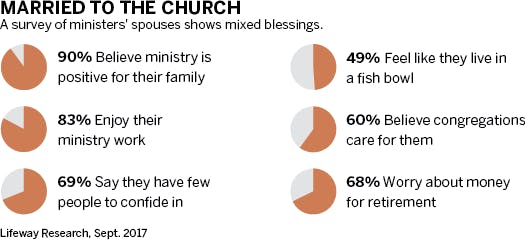Katie Zuraff is married to the church. She's the wife of the preacher behind the pulpit, an arrangement that brings both a deep sense of community and a feeling of "living in a fishbowl."
"As the spouse of a minister, you're supposed to be a role model and never reflect badly on your church," said Zuraff, whose husband served a Lutheran church outside Marshall for years. "You have to be careful about what you say, and who and where you say it."
Zuraff's experience echoes a new survey of pastor spouses, the often-overlooked part of the ministerial equation. The survey, conducted by LifeWay Research, an evangelical research group based in Nashville, found that the vast majority of spouses — 90 percent — believe ministry is positive for their families.
But many also feel isolated, with few close friends, and cite considerable financial worries. Three out of four spouses report they have few people they can confide in and worry about having enough money for retirement.
Spouses rarely have a voice in survey research, said Scott McConnell, executive director of LifeWay, which reviewed mail surveys completed by 720 Protestant spouses this summer. Previous research indicated pastors worried how work affected their families. LifeWay looked to spouses for answers.
"The contrast [in responses] is really sharp," McConnell said. "When we ask questions about spouse well-being and satisfaction in what they do, those are really high numbers. Eight of 10 are satisfied with their role in ministry.
"But 44 percent have experienced conflict with church staff and leadership," he said. "And 49 percent feel like they're living in a fishbowl."
Janet Beard, the wife of a Methodist pastor in Mound, identifies with those sentiments.
"I love being a leader in the church, supporting my husband," Beard said. "And I love the people."
But it can be "isolating," she said. "In the [United Methodist Church], we move frequently. So even if you establish community, you move again."
Most spouses, 85 percent, reported their church community "takes good care of us."
Zuraff described the ways: "We've had people offer to watch our kids so we can have a date night, or let them sit with them during the church service. We get invited to dinners, to functions, to coffee after church.
"But there are sacrifices, particularly if your husband is the only pastor," she said. "He is 'it' 365 days a year."
The spouses surveyed were a mixed group. Half had children at home; 55 percent held outside jobs. Eighty-six percent had responsibilities at church. Half had been married 20 years or more.
Zuraff, for example, stays home and cares for her four children, including a newborn. Beard's children are young adults. Some of the spouses lived in parsonages next to the church. Some lived miles away.
Stacy Vanderwerf, whose husband was recently the pastor at a Mankato Methodist church, said she enjoyed living in the parsonage. She could see her husband relatively easily. Church members often dropped off treats. But she had to monitor herself.
"You can't talk about your husband to people at the church because he's their pastor," she said. "It can be hard. Your life becomes a bubble."
For several years, Zuraff has helped plan a weekend retreat for spouses of Lutheran ministers in western Minnesota. Next month's retreat will include a chaplain — giving spouses a break from having your partner also be your minister.
McConnell says there's at least one takeaway. "Pastor Appreciation Month" is October, he said, and the spouse survey reminds us "there are other folks to think about too."
Faith & Values will explore Minnesota's ever-changing religious and spiritual landscape, spotlighting ideas and trends here and around the nation.
Jean Hopfensperger • 612-673-4511

73 years later, St. Peter man finally receiving his Purple Heart
Life sentence for man who fatally beat girlfriend while her children were nearby in her Medina home


